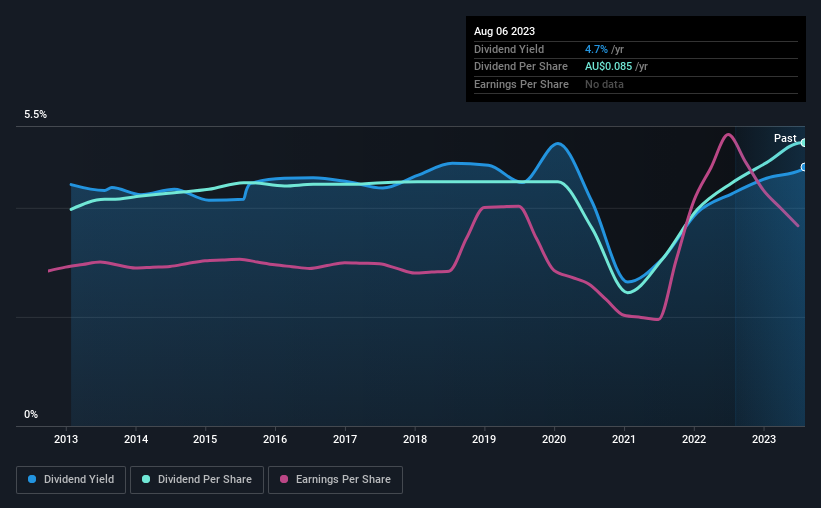Stock Analysis
- Australia
- /
- Capital Markets
- /
- ASX:BKI
Four Days Left Until BKI Investment Company Limited (ASX:BKI) Trades Ex-Dividend

BKI Investment Company Limited (ASX:BKI) stock is about to trade ex-dividend in four days. Typically, the ex-dividend date is one business day before the record date which is the date on which a company determines the shareholders eligible to receive a dividend. The ex-dividend date is an important date to be aware of as any purchase of the stock made on or after this date might mean a late settlement that doesn't show on the record date. Thus, you can purchase BKI Investment's shares before the 11th of August in order to receive the dividend, which the company will pay on the 29th of August.
The company's next dividend payment will be AU$0.04 per share, and in the last 12 months, the company paid a total of AU$0.085 per share. Looking at the last 12 months of distributions, BKI Investment has a trailing yield of approximately 4.7% on its current stock price of A$1.79. Dividends are a major contributor to investment returns for long term holders, but only if the dividend continues to be paid. We need to see whether the dividend is covered by earnings and if it's growing.
Check out our latest analysis for BKI Investment
Dividends are typically paid from company earnings. If a company pays more in dividends than it earned in profit, then the dividend could be unsustainable. It paid out 82% of its earnings as dividends last year, which is not unreasonable, but limits reinvestment in the business and leaves the dividend vulnerable to a business downturn. It could become a concern if earnings started to decline.
Companies that pay out less in dividends than they earn in profits generally have more sustainable dividends. The lower the payout ratio, the more wiggle room the business has before it could be forced to cut the dividend.
Click here to see how much of its profit BKI Investment paid out over the last 12 months.

Have Earnings And Dividends Been Growing?
Stocks in companies that generate sustainable earnings growth often make the best dividend prospects, as it is easier to lift the dividend when earnings are rising. If business enters a downturn and the dividend is cut, the company could see its value fall precipitously. This is why it's a relief to see BKI Investment earnings per share are up 4.1% per annum over the last five years.
We'd also point out that BKI Investment issued a meaningful number of new shares in the past year. It's hard to grow dividends per share when a company keeps creating new shares.
Many investors will assess a company's dividend performance by evaluating how much the dividend payments have changed over time. In the last 10 years, BKI Investment has lifted its dividend by approximately 2.7% a year on average. It's encouraging to see the company lifting dividends while earnings are growing, suggesting at least some corporate interest in rewarding shareholders.
To Sum It Up
Has BKI Investment got what it takes to maintain its dividend payments? Earnings per share have been growing at a reasonable rate, and the company is paying out a bit over half its earnings as dividends. It doesn't appear an outstanding opportunity, but could be worth a closer look.
If you're not too concerned about BKI Investment's ability to pay dividends, you should still be mindful of some of the other risks that this business faces. Case in point: We've spotted 3 warning signs for BKI Investment you should be aware of.
If you're in the market for strong dividend payers, we recommend checking our selection of top dividend stocks.
Valuation is complex, but we're helping make it simple.
Find out whether BKI Investment is potentially over or undervalued by checking out our comprehensive analysis, which includes fair value estimates, risks and warnings, dividends, insider transactions and financial health.
View the Free AnalysisHave feedback on this article? Concerned about the content? Get in touch with us directly. Alternatively, email editorial-team (at) simplywallst.com.
This article by Simply Wall St is general in nature. We provide commentary based on historical data and analyst forecasts only using an unbiased methodology and our articles are not intended to be financial advice. It does not constitute a recommendation to buy or sell any stock, and does not take account of your objectives, or your financial situation. We aim to bring you long-term focused analysis driven by fundamental data. Note that our analysis may not factor in the latest price-sensitive company announcements or qualitative material. Simply Wall St has no position in any stocks mentioned.
About ASX:BKI
BKI Investment
BKI Investment Company Limited is a publicly owned investment manager.
Excellent balance sheet with questionable track record.

